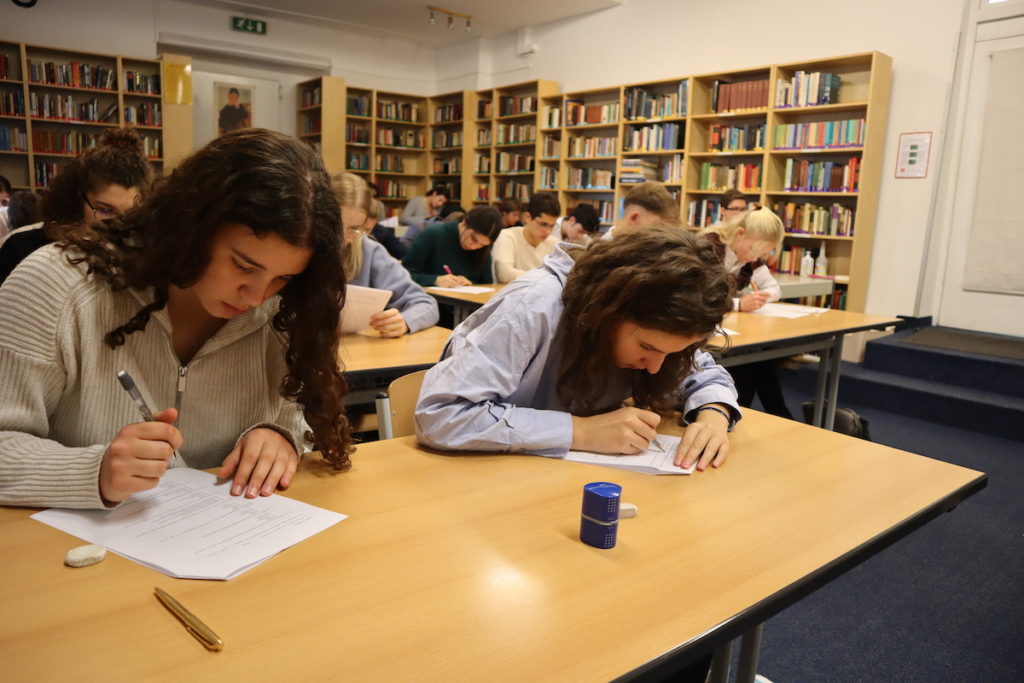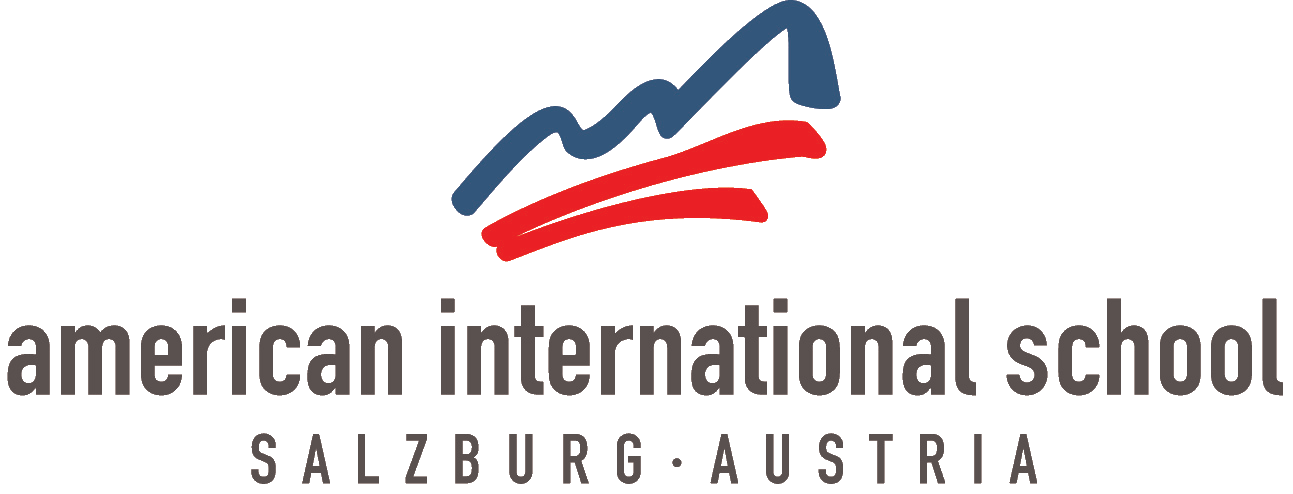
AIS-Salzburg requires that all students enroll in two instructional hours of English coursework daily at all grade levels. This allows expanded focus on the English curricular content by spreading it over two periods as well as increasing the amount of both fiction and non-fiction reading experiences before graduation. Additionally, this allows a greater emphasis on all students’ English proficiency in grammar, sentence structure, vocabulary, spelling, punctuation, and mechanics. This is considered necessary and beneficial given the high number of non-native English speakers enrolled at AIS-Salzburg. Native English speakers benefit from this program in terms of greater reading comprehension, the refining and polishing of composition skills, and by gaining a more comprehensive level of preparation for AP examinations and SATs. One of the two required English courses at each grade level maintains a focus on works of fiction and literary analysis; the other on non-fiction writing, vocabulary and communication skills. Both sections include composition, vocabulary and grammar as instructional elements. Both of these courses are required each year for both promotion and graduation and are full-credit offerings. In the 12th grade, seniors have the option of enrolling in the AP Literature or English 12 Fiction course. The second required credit for seniors focuses on Western humanities.
The English department seeks to foster and appreciation of all genres of literature in each student so that they will be able to use spoken, written, and visual language to accomplish their own purposes. At the same time, we strive to make all students aware of the importance of having grammatically correct oral and written communication skills that will serve them throughout their academic lives and in their future careers. Since most of our classes are quite small, students receive individual attention and are expected to participate actively and responsibly in a team environment. In addition, students develop the abilities and skills necessary to work independently. This allows students to be successful as a part of a whole class, in a small group, as well as independently. The English department is supportive of interdepartmental activities and tries to relate studies in other departments to English. Finally, as we an English department in an international school with an international setting and student body, we find it appropriate to use our classes as a forum for the exploration of our differing cultural heritages, thereby increasing our understanding of each other and enriching our study of literature.
Junior High English Literature and Composition provides students with the opportunity to expand and improve their communication skills in English. This course encompasses a variety of literature, language skills and composition techniques with the goal of extending the students’ abilities in listening, speaking, reading and writing. The study of literature covers a range of fictional genres that include short stories,poetry, and drama. The students also work with appropriate literary terminology for this level. Vocabulary development has a direct relationship to the literature studied and much of the vocabulary work is gleaned from the literature itself. The study of language (grammar) is emphasized with attention being given to basics. Students will work at improving and mastering basic grammar skills and will analyze structural aspects of the English language. In writing, students will learn the basics of formal composition form. They will engage in a variety of written exercises to develop analytical and organizational skills in sentence, paragraph and essay development.
To adequately prepare students for college and career, this course focuses on reading, comprehending, and analysing nonfiction works and learning to communicate ideas effectively. Nonfiction works will include diaries, speeches, essays, biographies, articles from journals and newspapers, books on various topics, as well as texts related to other classes the student is taking. The communication portion of the class focuses on effective writing (e.g. grammar, vocabulary, syntax & organizational strategies) of a variety of rhetorical modes including persuasive, argumentative, comparison, expository, political arguments, and personal statements. Effective presentation of materials through speeches, formal presentations, and projects are also an integral part of the course. The class also focuses on research skills, finding and evaluating sources and information, culminating in a grade appropriate research project.
English 9 Literature and Composition focuses on expanding students’ skills in a study of literary genres, grammar usage, composition and reading. The study of literature is arranged thematically and by genre. The emphasis on grammar usage will enable students to develop writing skills required for the English level in Grade 9. This introductory course in literature and composition is college-preparatory and will satisfy university demands for completion of a composition and literature course during the high-school years.
To adequately prepare students for college and career, this course focuses on reading, comprehending, and analysing nonfiction works and learning to communicate ideas effectively. Nonfiction works will include diaries, speeches, essays, biographies, articles from journals and newspapers, books on various topics, as well as texts related to other classes the student is taking. The communication portion of the class focuses on effective writing (e.g. grammar, vocabulary, syntax & organizational strategies) of a variety of rhetorical modes including persuasive, argumentative, comparison, expository, political arguments, and personal statements. Effective presentation of materials through speeches, formal presentations, and projects are also an integral part of the course. The class also focuses on research skills, finding and evaluating sources and information, culminating in a grade appropriate research project.
Composition and Literature Course focuses on expanding students’ skills in a study of literary genres, grammar usage, composition and reading. The study of literature is arranged thematically and by genre. The students will develop initial understanding of both American and World Literature. The emphasis on grammar usage will enable students to develop writing skills required for the English level in Grade 10. This course in literature and composition is college-preparatory and will satisfy university demands for 17 Course Listing completion of a composition and literature course during the high-school years.
To adequately prepare students for college and career, this course focuses on reading, comprehending, and analysing nonfiction works and learning to communicate ideas effectively. Nonfiction works will include diaries, speeches, essays, biographies, articles from journals and newspapers, books on various topics, as well as texts related to other classes the student is taking. The communication portion of the class focuses on effective writing (e.g. grammar, vocabulary, syntax & organizational strategies) of a variety of rhetorical modes including persuasive, argumentative, comparison, expository, political arguments, and personal statements. Effective presentation of materials through speeches, formal presentations, and projects are also an integral part of the course. The class also focuses on research skills, finding and evaluating sources and information, culminating in a grade appropriate research project.
The course emphasizes the study and consideration of the literary, cultural, and human significance of selected great works of the Western and non-Western literary traditions. An important goal of the class is to promote an understanding of the works within their cultural, historical and political contexts and of the enduring human values which unite different literary traditions. The course’s pedagogy gives special attention to critical thinking and writing within a framework of cultural diversity as well as comparative and interdisciplinary analysis. Students will be asked to think about their own place in the world, their effect on it, and how literature relates to culture and to their own lives. Students will interpret and compare world literatures as a study of representative works of world literature from Antiquity to contemporary times. Composition focus on understanding and utilizing the various rhetorical modes of discourse and especially the analysis of literature. Students will practice writing for different audiences and for different purposes about literature and use diction and syntax of increasing sophistication.
To adequately prepare students for college and career, this course focuses on reading, comprehending, and analysing nonfiction works and learning to communicate ideas effectively. Nonfiction works will include diaries, speeches, essays, biographies, articles from journals and newspapers, books on various topics, as well as texts related to other classes the student is taking. The communication portion of the class focuses on effective writing (e.g. grammar, vocabulary, syntax amp;#038; organizational strategies) of a variety of rhetorical modes including persuasive, argumentative, comparison, expository, political arguments, and personal statements. Effective presentation of materials through speeches, formal presentations, and projects are also an integral part of the course. The class also focuses on research skills, finding and evaluating sources and information, culminating in a grade appropriate research project.
Humanities is a course which presents a general and summary study of Western humanities. As the authors of your humanities textbook Arts and Culture point out, “The humanities are those areas of thought and creation whose subject is human experience. They include history, philosophy, religion, and the arts (visual art and architecture, drama, music, literature, photography and film), and are to be seen within the light of their historical and social context.” Although this one-year course cannot attempt to present and discuss all aspects of the Western humanities, a significant amount of this material will be covered with emphasis on the arts, philosophy, architecture, and their historical setting and context. Some class time will also be dedicated to the study of culturally significant pieces of literature which have become fundamental benchmarks in Western cultural development. Generally speaking, the humanities will be approached chronologically. We will begin the course with exploration of prehistoric, Mesopotamian and Egyptian cultures and their artistic expressions, eventually moving on to the Ancient Greeks and Homer. From there, we will proceed through Western European culture, moving from Aristophanes to Dante, to Shakespeare, and up to the 20th Century. By the time the course has finished, it is the intention of your instructor to have provided you with a sound, broad, and very important cultural basis which spans Western man’s historical times. This task will require excellent reading and thinking skills, a mind open to the variations and differences in Western cultures, excellent note-taking and composition skills, as well as the desire to become an informed, knowledgeable member of society. Composition and written work, regularly assigned, will pertain frequently to the literature currently being read and discussed but may also be dedicated to other areas of the humanities on occasion. Success in this course will provide you with a comprehensive and valuable awareness of most important aspects of Western culture; a valuable tool which can be applied to many areas of your future life and studies.
AP English Literature is a challenging course of study for students with solid writing skills and the ability to interpret literature. This college-level course engages students in the careful reading and critical analysis of poetry, short stories, novels, and plays written from the sixteenth to the twenty- first century. While literature written in English is emphasized, world literature in translation is addressed as weIl. Particular attention is paid to the varied devices used by writers to achieve their purposes. Students write college level essays and other pieces to support, analyze, and evaluate what they read. Preparation for the Advanced Placement Exam is also included.
